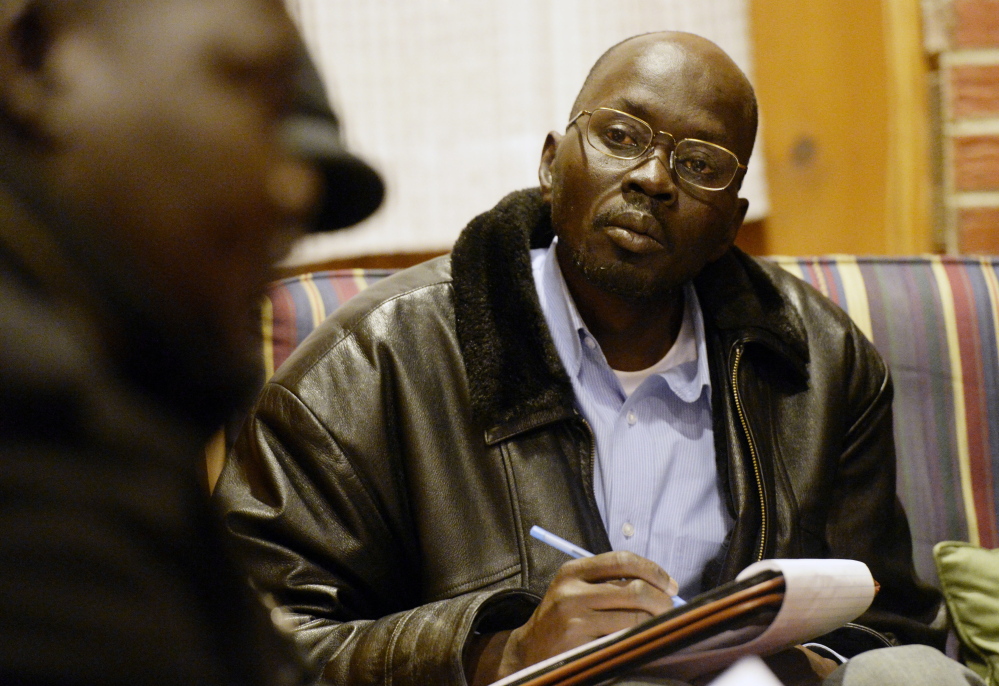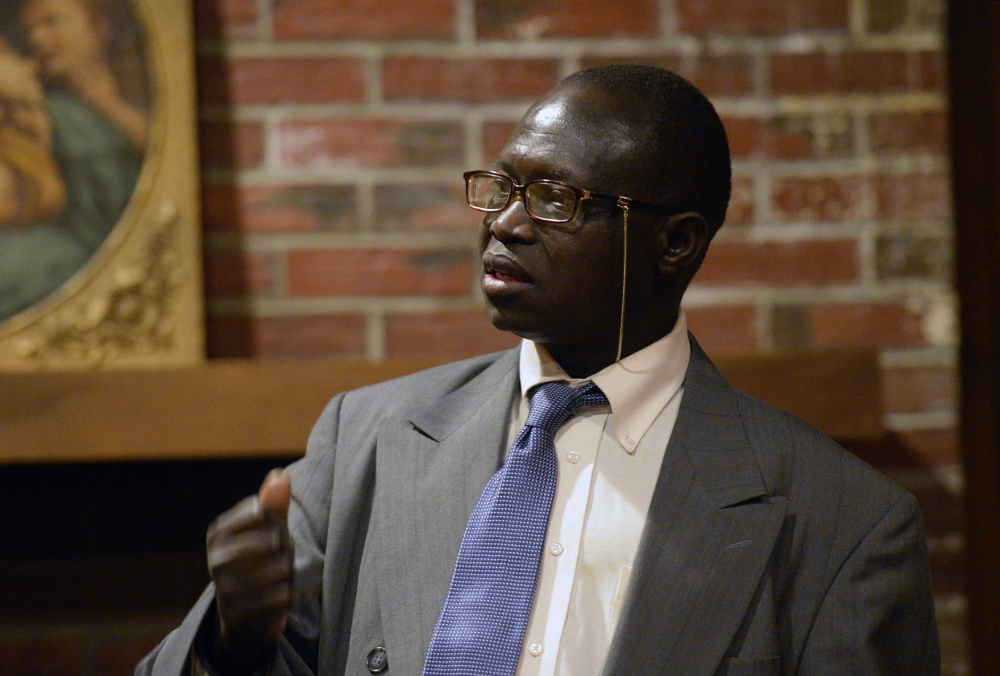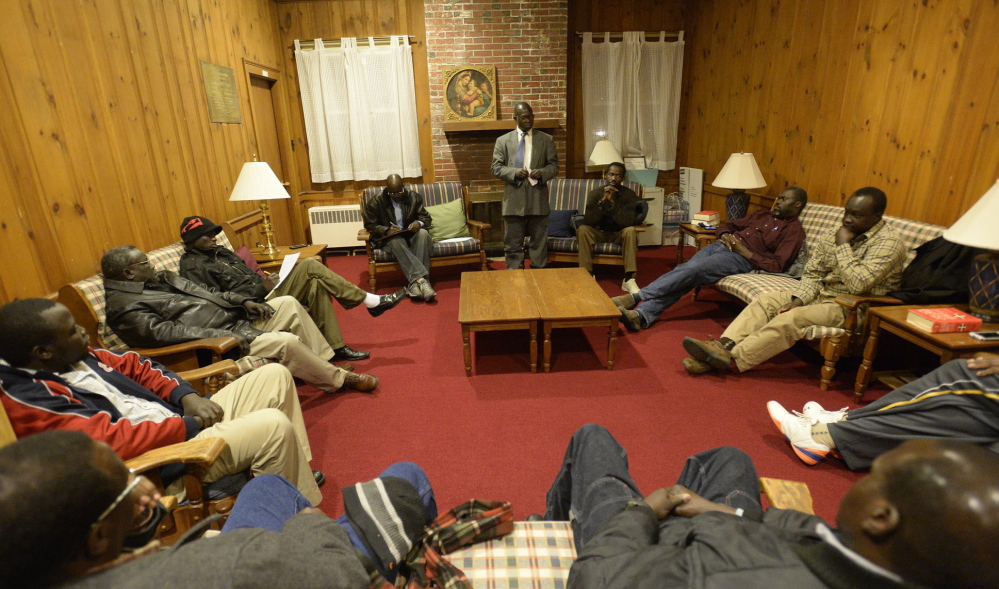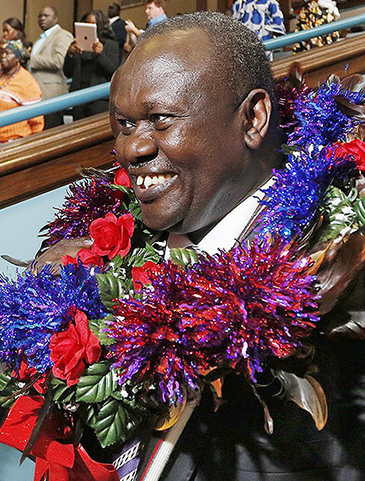Sudanese immigrants in Portland are increasingly worried about the weeklong conflict in South Sudan that has left hundreds dead and could escalate into an ethnic civil war.
Ninety percent of the estimated 3,500 Sudanese refugees living in Portland are from South Sudan, which gained independence from Sudan in 2011.
At the center of the conflict is Riek Machar, South Sudan’s former vice president, who has been accused by the country’s president of attempting a military coup. Machar visited Portland last year and was warmly greeted by hundreds of Sudanese refugees here.
A group of 16 male Sudanese elders met Saturday night at Trinity Church in Portland to discuss what steps they can take in the United States to encourage a peaceful resolution to the crisis.
Mariano Mawein, chairman of the Sudanese Community of Maine, said in a telephone interview Saturday night that the consensus of the elders was that the violence was instigated by the president and that he should resign immediately.
“To calm down the situation, he should stand down,” he said, referring to President Salva Kiir.
Mawein said military authorities should take control until a civilian government can be re-established.
He said the Sudanese Community of Maine will petition Maine’s congressional delegation to ask the U.S. government to push for an investigation into the causes of the recent violence.
Sudanese in Portland are frustrated by the violence and worried about the safety of family members back home in South Sudan, said Alfred Jacob, a refugee from South Sudan who owns a convenience store in Westbrook.
“All you can do is pray to God for their safety and well-being,” he said.
He said a brother and an uncle of one Portland resident were killed in the capital, Juba, where ethnic violence first broke out last Sunday night among South Sudan’s presidential guard. Fighting spread across the country over the next several days.
Tensions among rival ethnic groups, which have been simmering for months, have mounted in the past five days since Kiir accused his former vice president, Machar, of attempting a military coup, which Machar denied.
Both men belong to different ethnic groups. The president is a member of the Dinka group and the former vice president is a member of the Nuer ethnic group.
Ragina Nataniel, 45, of Portland, said she has worked with Machar in Sudan and described him as highly educated. She said Kiir has been acting as a dictator and has unjustly accused Machar of staging a coup in order to attack him.
However, the BBC reported on Saturday that Machar announced the forces fighting the government were under his command and that his forces had gained control of the state of Unity, which produces much of South Sudan’s oil. Oil accounts for more than 95 percent of the country’s economy.
Also on Saturday, U.S. aircraft flying into a region controlled by rebels to evacuate American citizens were attacked and forced to turn back without completing the mission, news services reported. Four service members were wounded, one seriously.
Much of the fighting appears to be centered on Machar’s hometown, Bentiu, which has about 8,000 people and serves as the administrative, political and commercial center of Unity State.
Indeed, there has been heavy gunfire in Bentiu and the adjacent town of Rubkona, said Chris Oyet, a relative of Jacob’s now in Bentiu.
In an email last week, Oyet said the shooting began in military barracks in Rubkona and then engulfed the town of Bentiu.
Nataniel said the violence has led to the deaths of many innocent civilians, including the neighbors of her parents in Juba. She said her parents are trapped in their house during the day. They only leave at night when it’s easier to see gunfire and determine from which direction it’s coming.
At the root of violence, Nataniel said, is the long-standing hatred between the Dinka and Nuer. She said the groups mark their faces to identify themselves.
She said she is worried that the ethnic strife could spread to Sudanese refugees living in America as the death toll increases back home. She doesn’t belong to either ethnic group.
“It’s here,” Nataniel said of the animosity between the Dinka and Nuer. “I am afraid they can clash.”
Jacob disagreed. He said Sudanese in Portland see themselves as one people.
“God has blessed us with a wonderful community that supports each other,” he said. “We all stand together to meet the challenges before us.”
Tom Bell can be contacted at 791-6369 or at:
tbell@pressherald.com
Twitter:TomBellPortland
Send questions/comments to the editors.






Success. Please wait for the page to reload. If the page does not reload within 5 seconds, please refresh the page.
Enter your email and password to access comments.
Hi, to comment on stories you must . This profile is in addition to your subscription and website login.
Already have a commenting profile? .
Invalid username/password.
Please check your email to confirm and complete your registration.
Only subscribers are eligible to post comments. Please subscribe or login first for digital access. Here’s why.
Use the form below to reset your password. When you've submitted your account email, we will send an email with a reset code.